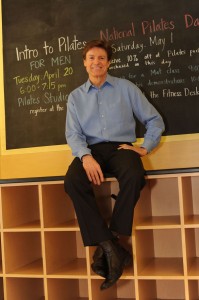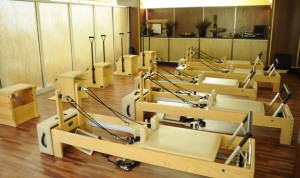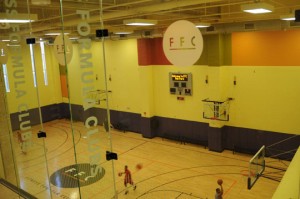 Founder and CEO Gale Landers grew his Fitness Formula Clubs in Chicago right out of the rich farmland that surrounds the Windy City and spreads across the state of Illinois. While growing up on the family farm, Landers discovered his passion of becoming an entrepreneur. From the farm, he set himself on a path to grow the 12-club location, 26-year-old FFC.
Founder and CEO Gale Landers grew his Fitness Formula Clubs in Chicago right out of the rich farmland that surrounds the Windy City and spreads across the state of Illinois. While growing up on the family farm, Landers discovered his passion of becoming an entrepreneur. From the farm, he set himself on a path to grow the 12-club location, 26-year-old FFC.
Considering Fitness Formula Clubs was developed in 1984, there has been a lot of time for Landers to mull over the right way to operate a fitness club. From the beginning, Landers knew he didn’t want Fitness Formula Clubs (FFC) to be just another gym. “You can tell a lot by the name,” Landers said. “We believe a club is something that you are a part of and something you feel connected to. A gym is often somewhere you drop in to work out.”
Landers concluded early on that one of the biggest factors in developing a club would be customer service. “We have differentiated our business by consistently providing high levels of customer service which has been the driver in attaining a strong track record of results,” Landers said. One way FFC tracks the quality of customer service is via member surveys that rate their clubs on everything from customer service and cleanliness to member referrals.
“At the end of the day club owners are very interested in knowing how likely a member is to recommend their club,” Landers said. “It provides a strong indication on how our mission is being carried out at each location.”
The fitness industry often refers to this as the Net Promoter Score. Over the years there have been many websites and studies devoted to the Net Promoter Score. For NPS formulas and additional information search online or check out the Harvard Business Review.
Keys to Owning a Successful Club
The key to success for FFC has been results. “We look at results in three different phases,” Landers explained. “One, for the members in helping them attain results from the commitment they’ve made. Secondly, results for our staff in terms of job opportunities, career advancement and continuing education; and thirdly, for our shareholder investors. We modeled the company largely through these high levels of results and our commitment to our five core values and we make our decisions accordingly to get results for all parties.”
The first and second phases of results were established with the training of employees. Regardless, if the employee is a trainer or staff member, the training must be top notch to help the members get results to further the career of the employee.
In order to gain these results for the members and employees, FFC has installed the Fitness Formula Training Academy that trains employees on different levels. “We try and accomplish three things with it,” Landers said. “One is to create a company-wide depth chart, and the second is to foster career paths and staff growth. Third, it promotes the advancement of club-to-club best practices.”
FFC offers classes for management that is instructed by senior management and certain outside professionals. The courses are ongoing and are targeted for various departments.
Landers explained that if all the training for the employees was successful, they could in turn get great results for the members and perpetuate the growth for the investors, the third group searching for results.
Members will help a club build its brand if they are able to hit their goals. For many club members, goals vary and getting results can take several different angles for club owners. “It’s all about the atmosphere and environment that you create and the brand attraction that the member sees,” Landers explained. “We have a saying that members may quit a club, but they won’t quit a club relationship.”
FFC has worked hard to create strong relationships between the staff and the members. “We spend a lot of time focusing on well-trained staff and creating that relationship,” Landers said. “If the member is an active, participating user, they are usually a satisfied member. By having individual goals, they see quantifiable results when they accomplish them.”
When members first join FFC they receive a quality consultation as a first step in creating the member stickiness. “It’s no mystery. In order to drive retention we push to make the club part of their lifestyle, establish their goals, and then provide the programs and high quality staff to meet those goals — as opposed to just having members just dropping in from time to time to work out at a gym,” Landers said.
“We strive to connect them quickly from the time they join,” Landers said. “The intent is to create traction from the beginning by putting them on a personalized path to get them personalized results. The ‘stickiness’ is built on the development of great team members who create social interaction between the staff and the members and amongst the members themselves.”

While attending college on a baseball scholarship and grabbing an Accounting degree and a masters in Athletic Administration along the way, Landers had decided that he wanted a career that included two things: to own his own business and work in some sort of athletic-related field. Prior to co-founding FFC his only ‘job’ was as a general manager at the Riviera Club, his first move towards fulfilling his dream.
He received his knack for business from his father who owned and ran the family farm. “I learned a lot from my parents,” Landers said. “It was business 101 if you really wanted to start a business. I watched my father plan in advance. He taught me to be disciplined on the expense side and careful on the debt side. But also to take some risks and be willing to put in long hours when needed. It channeled my interests at a young age and ultimately led to combining my intrinsic interest in athletics with a desire to create a business.”
When Landers opened FFC he knew that he wanted something other than a normal gym. He wanted a place where people could come and feel like they belonged. To kick off a successful career, Landers focused on excellent customer service and made it a mind frame for all of his staff.
Considering Landers has been in the fitness business for nearly 30 years, he has seen fluctuations in economic growth as well as consumer demand. “My view is every seven to nine years there is an economic down-cycle and it usually happens on the heels of some speculative consumer mindset,” Landers said. “During the good times, it’s important to prepare for those down cycles because you know it’s going to happen. From my view, that means one needs to be adept at managing the river of cash and avoid over leveraging. We like to preserve our balance sheet to prepare for any tough sledding that may come along.”
“I’m one who has been debt adverse. I prefer to borrow money in the down times and accelerate payback in good times, while allowing for unanticipated needs and opportunities.”
FFC acquired two new locations in late 2009, both of which are currently under renovation and expansion. They have used this economic downturn to broaden their market share of fitness consumers in Chicago. “Today’s consumer is establishing a new centering of priorities and re-thinking what is important and what is not,” Landers believes. “In the last 18 months, they are readjusting their value compass. They are weighing cost-to-value on all purchases and more than ever they support the businesses they trust. There is great opportunity for our industry to tap into that large market of non-members who know full well of the benefits of a healthy lifestyle, but simply haven’t bought in yet: the ‘unitiated believers’. Let’s go get them!” -CS











Comments 0